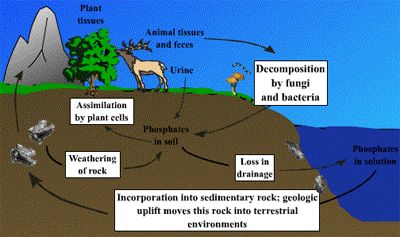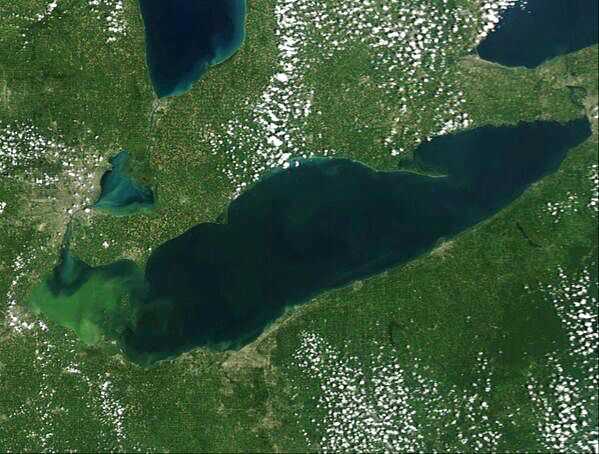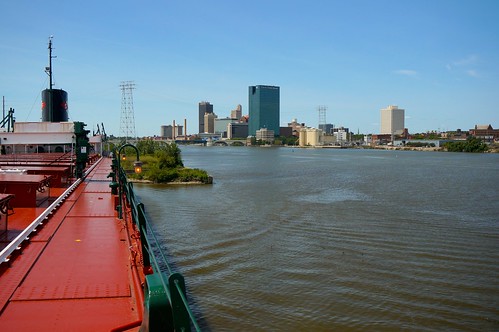Inroduction
Hello everyone. My name is Andy Dail, and I'm a professional gardener. I also volunteer with The Nature Conservancy. Last week, I participated in the monthly Twitter chat (#talknature) with The Nature Conservancy's team. This month was about farming practices and fresh water. I learned a lot from this chat that I'm concerned about, which I would like to share with all of you. This post will organize some of the points covered in this month's Twitter chat as well as organize some of the thoughts and content expressed.
1) Farming practices are having a huge impact on our Great Lakes.

2) Nitrogen buildup caused from inorganic n-p-k fertilizers are one of the causes of algae blooms in the Great Lakes

Wait! I thought the Great Lakes were supposed to be blue?
Some other things I observed.
1) It's very important that as consumers, we are aware of the effects of some farming practices.
2) Consumers need to know what produce is grown eco-friendly and which are not by labeling.3) While the government and farmers need to be concerned, it's the consumers job to encourage the demand of the products they want to consume.
I do not believe that farmers are not intentionally trying to damage the environment, they want to maximize production. And there are a lot already farming eco-friendly. There are inconstancies with laws and regulations and until funding catches up, there is more that needs to be done. Farmers are market driven and supporting the farmers that implement The Nature Conservancy's recommended practices will help the demand for eco-friendly grown produce. Even the plants that are inorganically grown need to be done so safety. It's not just the tomato you buy for your dinner plate that needs to be grown eco-friendly. It's the tomato in your spaghetti sauce, school lunches, and Little Caeser's pizza, virtually every tomato. It's not just humans that need organic fruits and veggies. It's the whole planet. The lakes, the fish, the birds are all demanding organic or more sustainable farming.
Check out this link to a video from The Nature Conservancy explaining more about the connection between fresh water and farming.
Should we really be concerned?
America’s Great Lakes — Erie, Superior, Michigan, Huron and Ontario — hold 21 percent of the world’s surface fresh water and host habitat for a variety of fish and wildlife species of concern. They provide drinking water for more than 40 million people and economic benefits from fishing and recreation. The Great Lakes Region is also a major agricultural area, with more than 55 million acres of land under production. - See more at: http://blogs.usda.gov/2015/01/16/rcpp-to-help-improve-water-quality-in-lake-erie-other-american-waterbodies/#sthash.t1MU8Ym7.dpuf
Also, please read more of what funding is available for this problem

So what's the answer?
The Nature Conservancy has come up with a simple strategy for farmers to implement. The following is a quote explaining the procedure:
The Nature Conservancy facilitated the Committee meetings over the last year, and a primary outcome has been the 4R Nutrient Stewardship Certification, a program that identifies and promotes proven best practices. The 4Rs of nutrient stewardship are:
- using the Right Source of fertilizer
- at the Right Rate
- at the Right Time and
- in the Right Place.
This science-based framework helps to achieve sustainable plant nutrition management while also considering the environment and economics
Click image below for article to learn more
What else can we do?
From what I'm noticing, this issue is being given funding and is being considered a big problem by the national government. The way these problems are handled can be influenced by the rate in which they are being implemented. Let's build up more awareness and demand for these issues to speed up the process.
1) Share this blog on Twitter and social media.
2) Participate in the twitter chats (see http://nature.org/talknature for a schedule of topics and dates) or search #talknature after to share the information with everyone, even those not living or directly affected by the Great Lakes.
3) Donate to nature.org any amount to contribute to this cause.
How you're already helping. And thank you.
Twitter and Facebook have contributed to spreading awareness on many issues around the world. This allows everyone to show concern not just those directly affected by the algae blooms in the Great Lakes, for example. The funny thing is everyone is affected by the Great Lakes. Fresh water, food, and entertainment are provided to everyone.
Donation efforts this year have already made an impact. Let's keep it going in 2015.
Next month's Twitter chat
Next month's Twitter chat will talk about fresh water again, but this time talking more about fresh and fish. The science expert is @etheostomatt, a good person to follow on Twitter. Please join the talk using #talknature in Twitter, and share the information. Join me in supporting The Nature Conservancy in spreading awareness. They will be discussing new issues every month. A full schedule of the Twitter chats is online at http://nature.org/talknature.
Conclusion
By simply participating in the #talknature Twitter chat, I learned lot of information that inspired me. I hope you all can experience the same effect by participating in the next one about fresh water and fish in the Great Lakes on Friday, March 20 at Noon. You are already helping by reading this blog right now and by spreading awareness, so pat yourself on the back while you share this blog post. I want everyone to know about the algae blooms. I want to see vegetables in the store with the 4Rs on the packing label. I also would like people to request more organic fruits and vegetables. What other things in the ecosystem are happening right now that I'm not mentioning in this blog? Pesticides, rototilling, etc. Even if you don't think you need to consume organic produce, remember, your choices affect you and others.
One more thing
I would like to thank everyone at The Nature Conservancy for participating in that chat. There were scientists taking their time to answer questions. I am very thankful they took the time to dedicate to this. I felt especially involved in the solution when my questions were answered by professionals. I felt like they really care and I was moved. I want to get more people involed in this amazing experience to ensure that they continue doing these chats. Thank you for reading this and I will see you online. Follow me @mr_backyard. Thanks again.
Mr. Backyard LLC
Andy Dail
website andydail.com
email: andrewd668@gmail.com
Twitter @mr_backyard

